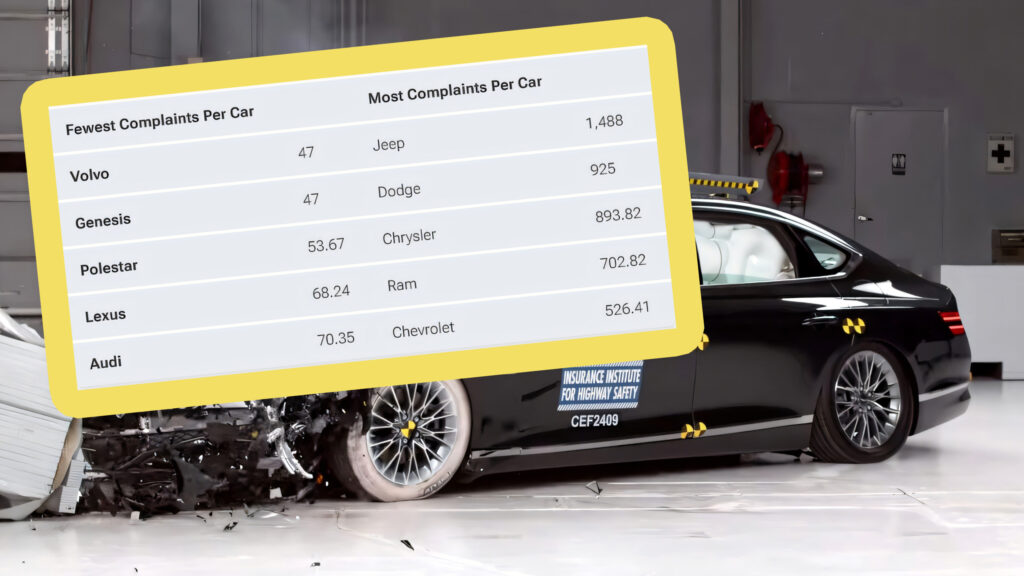- Several automakers haven’t launched a single new model in ten years without 5-star ratings.
- Genesis, Polestar, Buick, and Acura also performed strongly with consistently high safety scores.
- Volvo and Genesis reported the fewest customer complaints among all major automotive brands.
A new study reveals which car brands have dominated the safety ratings game in the U.S. over the last decade, shedding light on which automakers prioritize keeping their vehicles as safe as possible—or at least safe enough to pass standardized tests.
While the results seem reassuring, it’s worth asking: how much weight should we actually give these 5-star ratings when it comes to real-world performance? After all, these aren’t crash reports from actual accidents but rather controlled assessments under idealized conditions.
Read: Tall SUVs And Pickups 2-3 Times Deadlier For Pedestrians In Crashes, IIHS Study Finds
The study, put together by Confused, analyzed data from the New Car Assessment Program (NCAP), which rates a vehicle’s safety based on crash test performance, rollover resistance, and the effectiveness of advanced driver assistance systems (ADAS).
It identifies Volvo, Subaru, Tesla, Genesis, and Polestar as the (percentage) champions of safety tests. Every single new model released by these brands in the past decade has received a 5-star rating. That’s undeniably impressive on paper, but the reality is more complicated.
For starters, these tests are designed around specific crash scenarios, meaning a perfect score doesn’t necessarily guarantee the same level of protection in a chaotic highway pile-up or a poorly lit rural road. Additionally, the number of models tested matters—there’s a significant difference between evaluating three cars and testing over 100 from a single brand.
Volvo and Subaru: Leaders in the Lab
Leading the pack is Volvo, with 76 models achieving 5-star NCAP ratings in the past decade. Subaru comes in close behind with 72, followed by Tesla with 45. Positioned alongside these brands are Genesis and Polestar. Both of these companies are newer entrants to the market and, therefore, haven’t released as many cars. Nevertheless, each of them to be launched has received top safety marks.
Other top performers in the study (especially if you take into account the number of cars versus Polestar and Genesis), include Buick, with 98.31% of its cars getting 5-star ratings, followed by Acura with 98.18%, Honda with 94.59%, Mazda at 92.73%, and BMW at 91.30%. On the other hand, four brands, namely Mini, Fiat, Smart and Suzuki, failed to deliver a single 5-star-rated vehicle during the same period.
Brands With The Most 5-Star Rated Cars
The same study provides us with some other interesting industry trends. For example, cars built in 2024 have the highest proportion of 5-star safety ratings on record. This comes after a slight dip in average safety ratings in 2022, thought to have been triggered by carmakers using lower-quality parts and microchips in the midst of industry-wide shortages.
What About Customer Complaints?
However, safety ratings only tell part of the story. Customer complaints filed with the National Highway Traffic Safety Administration (NHTSA) offer a more grounded perspective on how these vehicles perform outside the lab.
Volvo and Genesis excel here too, with the fewest complaints per car with an average of 47.20 complaints made to the NHTSA per car launched. Other top performers included Polestar, Lexus, Audi, Mitsubishi, Smart, Lincoln, Cadillac, and Acura.
At the other end of the spectrum, Jeep owners filed an astronomical 1,487.83 complaints per car, making it the worst brand in this metric by a significant margin. Dodge, Chrysler, and Ram also fared poorly, with hundreds of complaints per car.
Customer complaint data adds nuance to the conversation about safety. While a high safety rating is important, a car with persistent technical issues, build quality problems, or ineffective ADAS systems can still create dangerous situations on the road. Tesla, for instance, boasts a perfect 5-star NCAP record but racks up 391.11 complaints per car.



